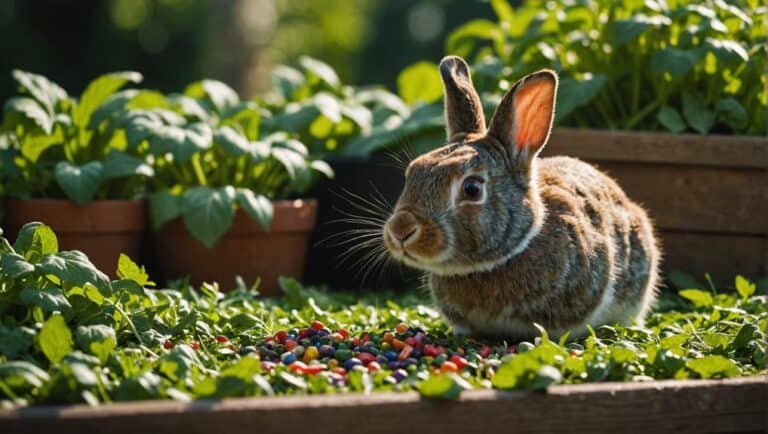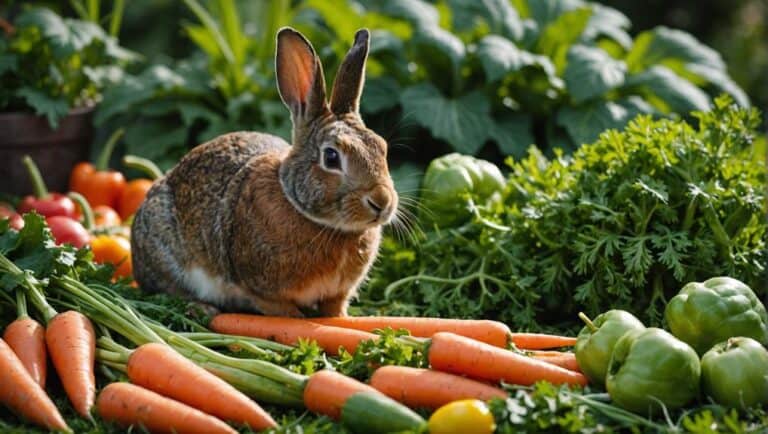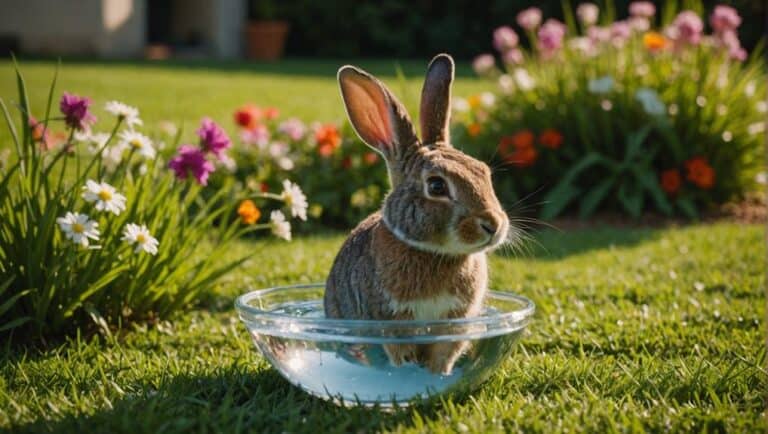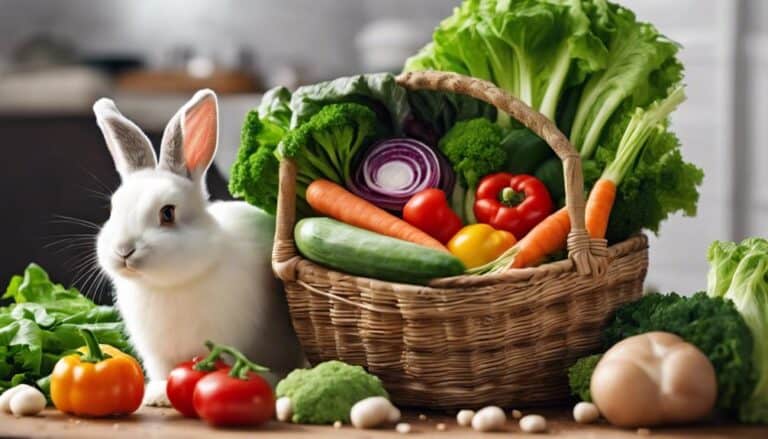Did you know that baby bunnies can grow up to three times their weight in just a few weeks? To support this rapid development, it's essential to provide them with the right nutrition. From their mother's milk to high-quality hay and pellets, each stage of their diet plays an important role. But how do you know when to introduce fresh greens, and what specific nutrients do they need at each age? Understanding these factors can make a significant difference in your bunny's health and growth.
Contents
Essential Nutrients for Baby Bunnies
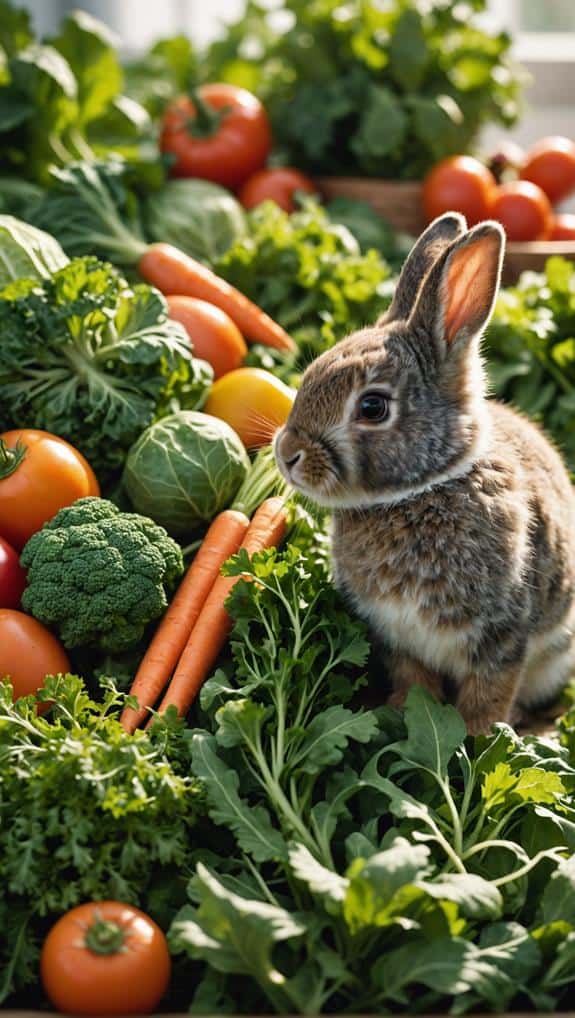
When caring for baby bunnies, understanding their essential nutrient requirements is critical for their growth and development. Until they're weaned at around 6-8 weeks old, their primary source of nutrition is mother's milk. This milk provides essential antibodies and nutrients that support healthy growth during this significant period.
Additionally, monitoring their weight gain and overall health is important to guarantee they're receiving adequate nutrition, as outlined in the key factors for baby bunny care.
At about 3-4 weeks, you should introduce alfalfa hay into their diet. This hay is rich in protein and calcium, which are important for their rapid growth. As baby bunnies shift to solid food, it's important to offer a limited portion of high-quality, alfalfa-based pellets—approximately ¼ cup daily, adjusted to their size and appetite.
Starting around 6 weeks, you can gradually incorporate fresh leafy greens, such as basil and dandelion greens. This diversity enhances their diet but should be introduced slowly to prevent digestive issues.
Don't forget hydration; around 3-4 weeks, baby bunnies need access to fresh, clean water. Proper hydration is key as their digestive system adjusts from mother's milk to solid food, making sure they stay healthy and thrive.
Ideal Diet Composition
A well-balanced diet is essential for baby bunnies to thrive during their significant growth stages. To guarantee healthy growth, provide unlimited access to high-quality hay, primarily Alfalfa hay, which is fundamental for their digestive health and offers the necessary protein during their early life.
Proper nutrition is imperative for overall health and well-being, so you should also include specially formulated junior pellets in their diet, offering about 1/4 cup per rabbit daily, adjusting based on their appetite and growth needs.
As your young rabbits grow, gradually introduce grass hays like Timothy Hay or Meadow hay while reducing Alfalfa hay intake after about 4-5 months to prevent health issues later on.
Starting around six weeks old, you can begin incorporating fresh leafy greens into their diet. Introduce these greens one type at a time in small quantities to monitor for any digestive issues.
A balanced diet for young rabbits includes a diverse array of hay, age-appropriate junior pellets, and gradually introduced fresh foods. By focusing on these dietary components, you can support their overall health and promote healthy growth throughout their development. As rabbits mature, their nutritional needs will change, necessitating adjustments to their diet to align with senior rabbit dietary requirements. It is essential to transition to a diet that focuses more on hay and less on pellets as they age, ensuring they maintain proper gut health and prevent obesity. Regular vet check-ups will help monitor their dietary needs and keep them thriving in their later years.
Introducing Fresh Foods
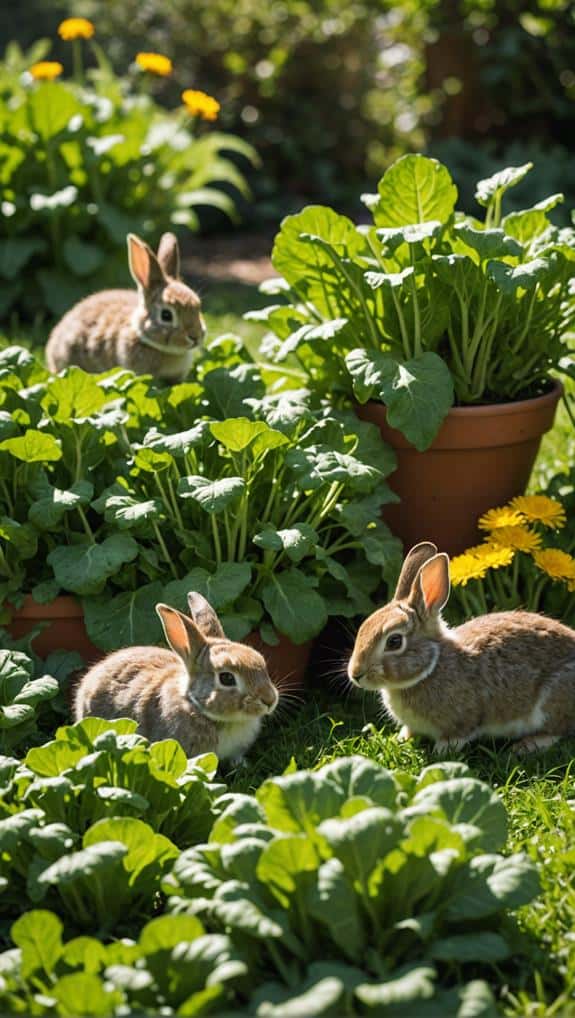
Introducing fresh foods to baby bunnies can be a rewarding experience, but it's important to do so carefully to prevent any digestive issues.
Begin this process around 12 weeks old, introducing new vegetables gradually. Start with one type of safe vegetable at a time, which allows your bunny to test for tolerance and helps you monitor any adverse reactions. Incorporating a variety of top vegetables for a bunny's diet can enhance their nutritional intake and overall health.
Offer small quantities of safe vegetables, such as basil and dandelion greens, to enhance dietary variety and enjoyment.
This approach not only makes mealtime exciting but also helps guarantee your baby bunny receives essential nutrients. Be cautious to avoid high-starch and sugary vegetables, as these can lead to digestive upset and obesity in young rabbits.
As you introduce fresh foods, it's vital to closely monitor your bunny's overall health, weight, and droppings after each new addition.
This vigilance will help you determine if your bunny is tolerating the new foods well and make adjustments as necessary. By following these guidelines, you can support your baby bunny's health while providing a diverse and enjoyable diet.
Monitoring Health and Growth
Monitoring your baby bunny's health and growth is fundamental as you introduce fresh foods into their diet. Start by regularly checking their droppings; they should be cocoa puff-shaped, indicating proper digestion. Any change in droppings may signal dietary issues that need addressing.
It's also essential to track their weight weekly to guarantee they're gaining steadily during their first few months.
Observe their eating habits closely. If your bunny refuses to eat or drink for more than 12-24 hours, seek veterinary assistance immediately. Daily checks on energy levels and activity are critical as well; lethargy can indicate underlying health problems.
Keep a log of any dietary adjustments you make, noting how your bunny responds to different foods. This will help you identify which combinations of pellets, hay, and fresh vegetables support peak health and growth.
Always provide fresh water to keep your bunny hydrated and healthy. By being attentive to these aspects, you can guarantee your baby bunny thrives on their new diet, promoting their overall health and happiness.
Transitioning to Adult Diet
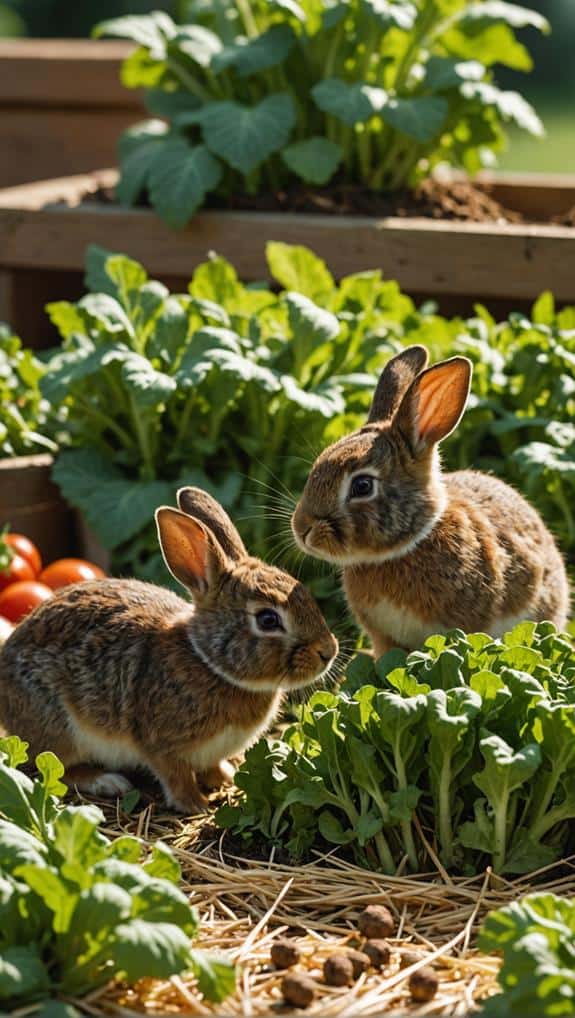
As your baby bunny reaches six months of age, it's important to begin adjusting them to an adult diet gradually.
Start by increasing the proportion of grass hay, such as Timothy, while decreasing alfalfa hay to avoid potential digestive issues. Adult rabbits primarily require grass hay, and you should provide approximately ⅓ cup of high-quality adult pellets per 2 pounds of body weight for ideal health.
Avoid making abrupt dietary changes during this shift, as young rabbits can experience digestive stress, leading to health complications. Instead, implement changes slowly over a week or two, allowing their digestive system to adapt.
Monitor your bunny's weight and overall health closely during this period. If you notice any signs of discomfort or weight loss, reassess their diet and make necessary adjustments.
Incorporating a variety of grass-based hays, like orchard or meadow hay, can keep the diet interesting and encourage consistent hay consumption, which is vital for their digestive health.
Final Thoughts
In summary, feeding your baby bunnies the right diet is essential for their healthy development. By starting with their mother's milk and gradually introducing alfalfa hay, pellets, and leafy greens, you're setting them up for success. Just like how unexpected friendships can bloom in the most unlikely places, your attentive care can lead to vibrant, happy bunnies. Keep monitoring their health as they grow, and soon, you'll have well-nourished rabbits ready for adult life!

